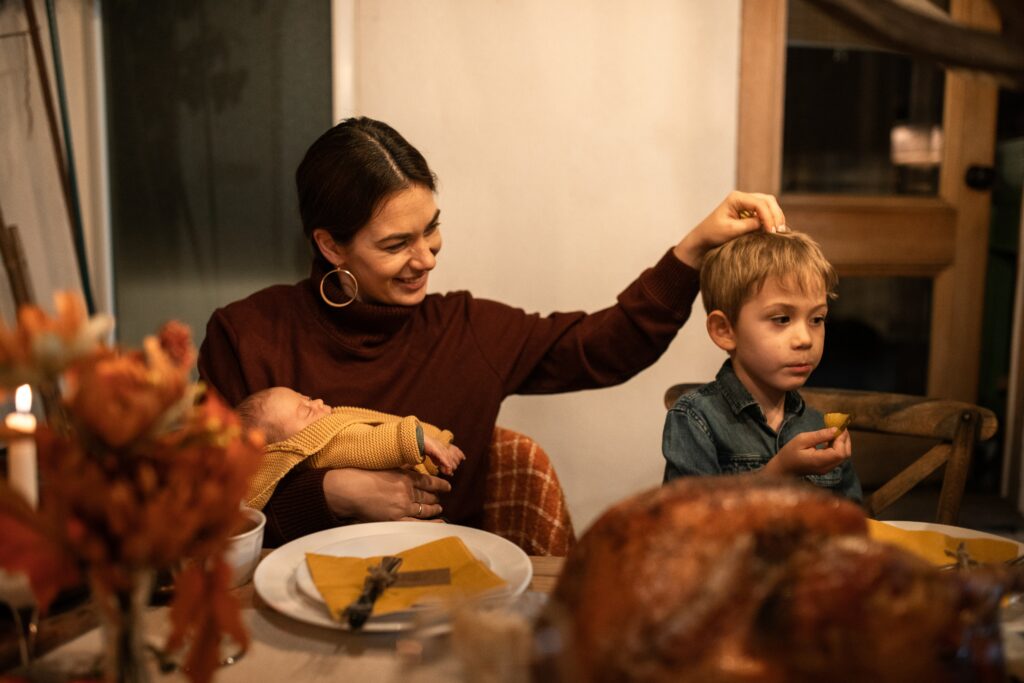
How To Calm Down Anxiety By Practicing Gratitude
What’s the first thought that comes to your mind when you think about the Thanksgiving holiday? For me, I think of family and food—lots and lots of food. Of course, I also think about what I am grateful for, but if I’m honest, I have to say that food comes to my mind pretty quickly. And not just any food but the mouth-watering spread that makes up the typical Thanksgiving dinner. I don’t know about you, but it’s not every day I’m eating turkey, dressing, mashed potatoes and gravy, and the rest of the fixings. So, I get excited. Okay? But honestly, the holiday is not just about the food. For it’s important to remember it’s about celebrating gratitude also. Now since you are here reading this blog, I’m going to assume you are looking for real answers to your question of “How do you calm down anxiety”? And I believe I have an answer for you, but first.
Brain food and your mood
Do you know how you feel sluggish and tired after eating all that food on Thanksgiving? Well, that’s because of what you put into your digestive system. If you can think of your mind the same way, you’ll realize that what you put into it impacts how you feel.
Feeding your mind a constant flow of things such as worry, fear, envy, self-criticism, and negative news is bound to impact your mental wellbeing negatively. So, let’s change that up and give your mind a healthy eating plan to help calm your anxiety. How can we do that? Well, one way is to practice gratitude.
PRACTICING GRATITUDE
Have you ever noticed how anxiety feels heavy and gratitude feels light? That’s because expressing gratitude causes your brain to release dopamine and serotonin—two hormones that make you feel lighter and happier inside.
Practicing gratitude is something we should all be practicing not just at Thanksgiving but all year long. And that’s because the benefits are so great. So, let’s look at some practical ways we can incorporate some gratitude into our lives.
Ways to find and practice gratitude
1. Look for goodness. Practicing gratitude doesn’t mean you stick your head in the sand and ignore your problems. Or that your life is not perfect. On the contrary, it means that despite your anxious thoughts, you actively look for the good things (big or small) in your life regardless of the bad.
2. Set gratitude reminders. It’s easy to get caught up in the daily grind of life and focus only on what is going wrong during the day. So take some steps to remind yourself of things you can be grateful for. It can be as easy as setting the alarm on your phone to go off at regular intervals. When it goes off, take a moment and think of something that makes you feel thankful. Or visual reminders like post-it notes strategically placed in areas you frequent throughout the day, such as the kitchen, bathroom mirror, desk, nightstand, etc. Even though you are setting these alerts up ahead of time, you are training your brain (and heart) to express gratitude.
3. Keep a gratitude journal. Take a few moments in the morning and evening of each day to write down something you can be thankful for. It can be something as simple as “I feel grateful today that I have hot water for a shower.” Or “I’m grateful for the roof over my head.” No matter how hard life feels, there really is always something to be thankful for if you look for it.
4. Practice and don’t stop practicing. Practicing gratitude may start as a practice, but eventually, it will become more natural. It’s a skill, and just like any other skill, the more you practice, the better you become at it. However, it can also fade from non-use. So keep on practicing until it becomes a habit.
“Interrupt anxiety with gratitude.” — Danielle Laporte
Practicing gratitude isn’t going to calm your anxiety overnight, but it can be beneficial in lessening your anxiety. In fact, did you know it is scientifically impossible for your brain to feel stress and gratitude simultaneously? The two emotions may alternate, but you can’t feel them at the same time. So at the very least, by practicing gratitude, you’re putting your anxiety on pause. And at the most, by cultivating a more appreciative attitude in life, you’re telling yourself there’s a lot less to feel anxious about and a lot more to feel joyous about.
I believe it’s good practice to take the opportunity each day to express gratitude. If for nothing else but to guard ourselves against taking things for granted. And something else I like to keep in mind is that gratitude isn’t just about being grateful for what we have. But it can also mean being grateful for what we can give others.
After using the ways I shared above of finding and practicing gratitude, you would like to learn additional ways on how to calm down anxiety; working with a coach is a great way to do it. A coach can help you discover the best calming techniques that will work for you. They will also encourage you to keep practicing them until they becomes second nature when you start to feel anxious.
Hi, I’m Kris Henderson, LPC. I want you to know that I am here to help. xxxxxxxx If you want more personalized support, I invite you to contact me or schedule your phone call today. In the meantime, I hope you have a wonderful Thanksgiving and find many things to be grateful for.
This article originally appeared on My Anxiety Link
